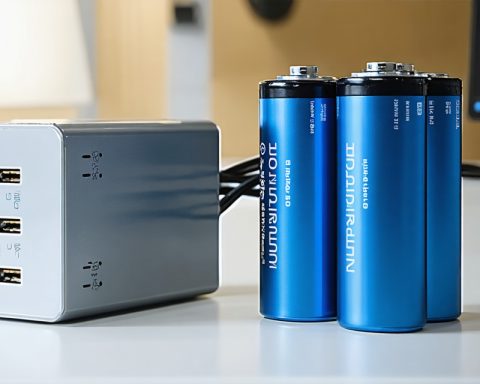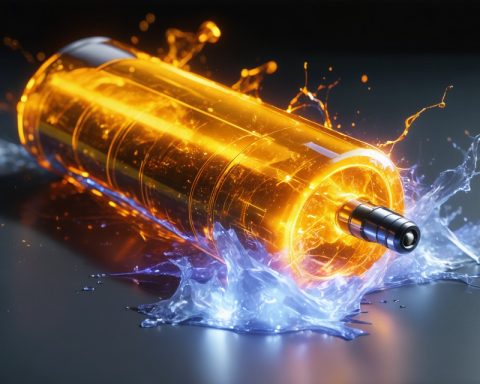In the pursuit of reducing carbon footprints and adopting sustainable energy sources, the race to electrify transportation has gained unprecedented momentum. At the heart of this evolution is the role of cutting-edge battery technology, especially solid-state batteries (SSBs), which are paving the way for a safer and more efficient future.
Revolutionizing Battery Technology
Solid-state batteries differ from traditional lithium-ion batteries by using a solid electrolyte instead of a liquid one. This innovation not only increases safety by eliminating risks like leaks and fires but also promises a more compact and powerful energy source. These batteries can store more energy and charge at significantly faster rates, making them an attractive option for sectors like the automotive industry.
China’s Bold Initiative
To spearhead advancements in this field, China has launched an ambitious initiative called the China All-Solid-State Battery Collaborative Innovation Platform (CASIP). With over $830 million allocated, this initiative aims to unite battery manufacturers, research institutions, and government agencies to place China at the forefront of SSB technology. The goal is to redefine energy storage, enhance electric vehicle (EV) performance, and drive forward global sustainability efforts.
Silicon and Sulfide Innovations
The future of solid-state batteries looks promising with developments in silicon and sulfide-based technologies. Silicon anodes offer up to ten times the energy capacity of traditional graphite anodes, while sulfide electrolytes increase battery efficiency and safety. Chinese companies, including Huawei and CATL, are leading the way with innovative approaches to tackle the challenges posed by these materials, ensuring the durability and reliability of next-generation batteries.
Through these endeavors, China is not only positioning itself as a leader in the battery industry but also reshaping the landscape of global energy storage.
The Rise of Solid-State Batteries: Are They a Game Changer or a Pipe Dream?
In recent years, there has been a significant shift towards reducing carbon emissions and adopting sustainable energy sources. In this effort, electrifying transportation has emerged as a pivotal element. Central to this revolution is the advancement of battery technology, particularly solid-state batteries (SSBs), which are transforming how we envisage a safer and more efficient future.
Revamping Energy Storage: The Promise of Solid-State Batteries
Solid-state batteries represent a leap from traditional lithium-ion batteries by utilizing a solid electrolyte as opposed to a liquid one. This leap forward enhances safety by mitigating risks such as leaks and fires and also offers a more compact yet powerful energy storage solution. SSBs can store more energy and can be charged at notably faster rates, making them particularly appealing within the automotive industry and other sectors seeking high efficiency.
China’s Visionary Step Forward: The CASIP Initiative
To lead the charge in solid-state battery advancements, China has rolled out an ambitious program known as the China All-Solid-State Battery Collaborative Innovation Platform (CASIP). With an investment of over $830 million, this initiative is poised to integrate battery manufacturers, academic researchers, and governmental entities. The aim is to position China at the vanguard of SSB technology, redefining energy storage and improving electric vehicle (EV) performance as part of a broader push towards global sustainability.
Cutting-Edge Silicon and Sulfide Innovations
The outlook for solid-state batteries is bright, thanks to advancements in silicon and sulfide technology. Silicon anodes provide up to ten times the energy capacity of traditional graphite anodes, while sulfide electrolytes enhance battery efficiency and safety. Major Chinese corporations like Huawei and CATL are spearheading these innovations, addressing the challenges inherent in these materials and ensuring that the next generation of batteries is both durable and reliable.
Interesting Facts and Controversies
While the potential of solid-state batteries is considerable, the path is not without hurdles. SSBs boast longer lifespan and are more environmentally friendly due to reduced need for rare metals. However, they are currently more costly and challenging to produce on a mass scale, sparking debates about their immediate feasibility and affordability for widespread use.
Chinese dominance in SSB technology has stirred anxieties over global dependency and economic imbalances. Can other nations keep pace, or will this lead to a single-country monopoly in battery tech?
Advantages and Disadvantages of Solid-State Batteries
Advantages:
– Increased safety with reduced risks of leaks or fires.
– Greater energy density, leading to improved battery capacity and range.
– Faster charging times, enhancing consumer convenience.
Disadvantages:
– High production costs making them less commercially viable at present.
– Technical challenges in scaling up production efficiently.
– Limited current availability in the consumer market.
Related Questions
Why are solid-state batteries not yet mainstream?
Despite their advantages, the primary barriers are high production costs and the complexity of large-scale manufacturing. Further research and investment are needed to overcome these challenges.
How could this technology impact the EV market?
SSBs could revolutionize the EV market by providing vehicles with longer ranges, faster charging times, and improved safety. This could accelerate EV adoption globally if cost and manufacturing hurdles are resolved.
Suggested Related Links
– https://www.huawei.com
– https://www.catl.com
These links contain extensive information on industry advancements and the companies’ roles in battery technology.












